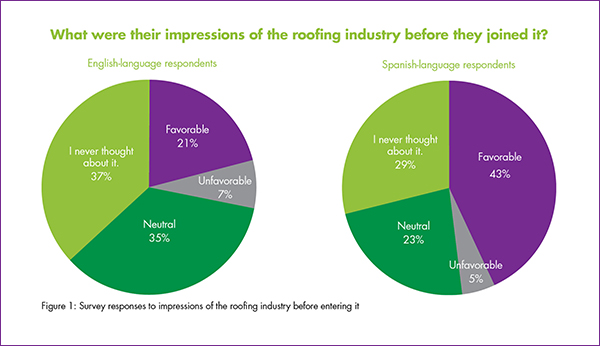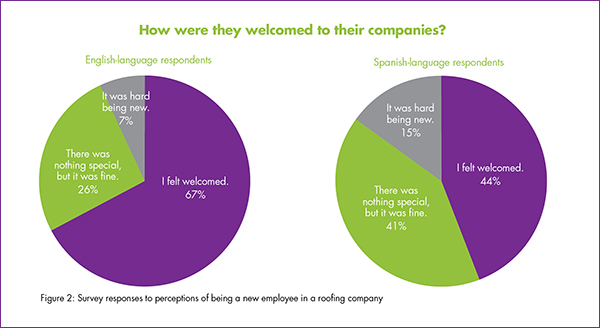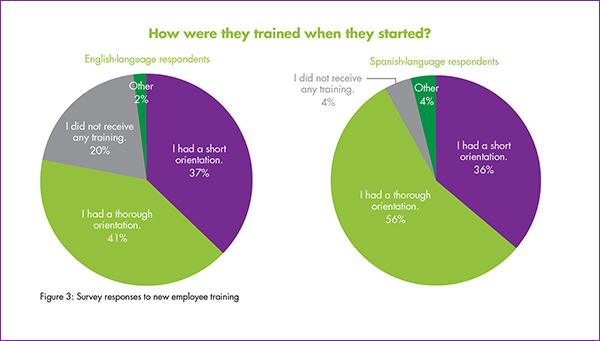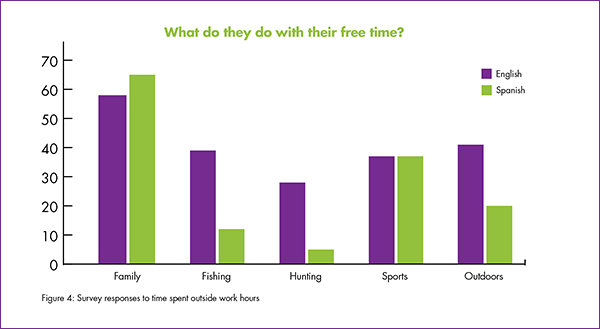These days, most conversations among roofing contractors end up, at some point, mentioning how difficult it is to find effective field employees. NRCA's Workforce Solutions Committee was charged with addressing the issue and determined the industry needed an overarching look at the existing workforce before it could determine why new recruits are so elusive.
The industry is filled with successful companies full of men and women who love their jobs, so following the old adage "success breeds success," in 2015, NRCA's Workforce Solutions Committee commissioned a survey of roofing employees to understand what compelled them to work for roofing companies and what keeps them there.
The survey
The survey was designed to be taken by field employees: superintendents, foremen, roof mechanics and laborers. The survey was emailed to 140 companies: 70 current and immediate-past NRCA board member contractors, and 70 randomly selected member contractors. Although survey respondents could have completed and returned the survey anonymously many companies chose to scan and email responses from their employees, so it was possible to identify a majority of participating companies. As a result, we know a majority of responses were from current NRCA board member companies.
We can assume a principal member of a company is engaging with his or her national association because his or her company is highly effective, even without that person present. This creates a bias because, presumably, employees who work for great companies are happier in their work than employees at less-than-great companies. Perhaps the assumption is valid and perhaps not, but it needs to be stated.
As you read through the following survey results, certainly you will be led to consider how your employees' opinions stack up against the data presented here and how it may affect your recruiting efforts.
Demographics
The following provide basic information about the survey and its respondents (not all percentages equal 100 percent because of survey nonresponses):
- Total number of surveys completed: 615 (610 men; five women)
- Number of English-language surveys completed: 402
- Number of Spanish-language surveys completed: 213
- Percent of laborers and roof mechanics: 43 (35 percent English; 60 percent Spanish)
- Percent of lead men, foremen and superintendents: 50 (58 percent English; 36 percent Spanish)
- Average age: 33
- Average tenure at companies: Five to six years
- Average experience in the industry: Nine years
The intent with offering Spanish- and English-language surveys was to increase responses. The committee did not consider whether there would be differences between the groups; however, some differences emerged and are noted.
It is assumed people who completed the Spanish survey did so because Spanish is their first language, and this group probably comprises first-generation immigrants. However, the committee does not make a similar assumption about those who completed the English survey because this group also could comprise first-generation, native Spanish-speaking individuals who completed the survey in English.
Many respondents chose to add comments, and a majority of the comments were favorable. In general, respondents love their jobs and feel good about the companies for which they work. Of course, there are some who wish they had ended up in any career but roofing, but, those employees are the exception.
Results
The first set of questions asked how and under what circumstances respondents entered the roofing industry. Because roofing does not enjoy a prestigious image in the U.S., the committee was interested to know how many of those currently in the industry struggled to enter it based on any negative impressions they may have had. The data reveal, in fact, impression was not a problem (see Figure 1). Only 7 percent of English-speaking respondents and 5 percent of Spanish-speaking respondents indicated having an unfavorable impression of the industry before entering it.

Figure 1: Survey responses to impressions of the roofing industry before entering it |
One of the main pieces of information the committee wanted to know was the paths of entry into the roofing industry: How did survey respondents end up working in roofing?
Although some respondents found their jobs online or by responding to a Help Wanted sign or advertisement, a majority came through referrals. You may be surprised to learn the percentage of employees who came through referrals is 78 percent (English-language survey) and 91 percent (Spanish-language survey). And of these, the scale is tilted toward friends over family.
Later in the survey, we asked how many employees are willing to make referrals. Again, the numbers are high. Up to 90 percent of respondents are willing to refer people to the roofing industry in general, and up to 94 percent are willing to make referrals to their own companies.
Based on the survey information regarding how important referrals are to bringing in new employees, the following are questions you may want to discuss with your leadership team:
- How well do you know your employees? If they are your No. 1 resource for recruiting, should you be taking the time to get to know who is most outgoing, particularly social and plugged in to large networks of people?
- Should you consider having a friends and family event for recruitment purposes? For example, should you have a "picnic with a purpose" where you provide food, beverages and a presentation about what it's like to work for your company?
- How hard are you working to ensure your company is the kind of place employees want to be and want to bring their friends and family members?
New employees
Once committee members knew the route employees took to find their companies, they were interested in how these employees experienced being a new employee (see Figure 2). About 7 percent of English-language respondents felt being new was difficult, but twice as many Spanish-language respondents (15 percent) felt being new was difficult. How new employees feel about their companies in their first few days, weeks and months has a lot to do with how long or whether they stay. Naturally, it would be helpful to know how those who did not remain after the first few days, weeks or months felt about their welcome, but the data, clearly, do not provide that information.

Figure 2: Survey responses to perceptions of being a new employee in a roofing company |
It is surprising that of the English-language respondents, 20 percent said they did not receive any training (see Figure 3) particularly in comparison with the Spanish-language respondents, almost all of whom said they received training.

Figure 3: Survey responses to new employee training |
Based on data received about new employees, you should ask yourself:
- Do you do a good job of welcoming new employees? Do they feel expected and known from their first moments?
- Have you prepared a training experience for them during their first few days, or are you throwing them into the job unprepared?
- Do you take the time to explain your company, expectations and the types of careers they can expect to have if they meet your standards?
Pros and cons
The next set of questions focused on the pros and cons of respondents' jobs to date. What do employees like and not like? What suggestions do they have for their companies?
A majority of respondents indicated working outside is what they most like about their jobs. The second-highest ranked answer for Spanish-language respondents, at 30 percent and almost ranking as high as working outside, is working for a great company. More than 10 percent of English-language respondents also said working for a great company is what they value most. Other answers that scored high are having pride in their work, working on a variety of projects and working with their crews.
What do employees enjoy least? Apparently working outside represents "the best of times and the worst of times" because the highest ranking dislike is bad weather followed by safety hazards, lack of benefits, low pay, and poor communication with crews and management.
Respondents also were asked to recommend ways to improve their companies. Most respondents said better salaries, benefits and communication would improve their workplaces. Having said this, survey respondents were asked whether they believe they are fairly compensated, and 75 percent said they believe they are.
An interesting distinction occurs between the English- and Spanish-language respondents regarding salary and benefits, particularly benefits. Many more Spanish-language respondents indicate the desire for increases in these areas. Going back to the survey demographics, it is notable the Spanish-language respondents represent a majority of roof mechanics and laborers whereas the English-language respondent population is more heavily weighted toward field management. It is reasonable to conclude lower-paid employees would see more need for increased income and benefits.
Based on the data about company likes and dislikes, consider the following:
- Do your employees believe your company is great? How do you think they would define "great"?
- Do your employees believe they are fairly compensated? (Note: This is a much different question than whether they wish to be paid more.)
- How can you make your company better in ways you haven't considered?
Training
The second-tier answers to the question regarding how companies could improve are worth discussing because they are fantastic ways to improve your company culture without costing much. The second triad of answers consisted of offering more training, treating employees with more respect and showing appreciation.
Of course, training is not cost-free, but relative to the cost of not training (mistakes, injuries, trouble retaining good employees, etc.), it is a worthy investment. It also aligns with the other previous topics in terms of being part of a company's culture. Being a company that trains, respects and appreciates its employees definitely is a culture issue, and culture comes directly from the top. Being a great company that honors its people often is not about paying more, but it does require effort.
Nonwork hours
The final question had nothing to do with respondents' jobs or companies: What do you do in your free time? The motivation behind this question was getting to know employees and understanding what may help motivate them. As expected, there were an abundance of answers, but the clear winner was time with family (see Figure 4).

Figure 4: Survey responses to time spent outside work hours |
Begin the conversations
So what does all this mean for you and your company?
The Workforce Solutions Committee conducted the survey to find out more about current and successful employees to help contractors recruit and retain more employees like them. It included questions for you to consider to help you take advantage of the resulting information.
There is no magic bullet for recruiting. Some contractors argue people who are part of the younger generation don't want to work in roofing and, even if they do join a roofing company, contractors don't know how to motivate them. There may be some arguable differences that will reshape the workplace, but people are still people: They want fairness and belonging in a place where they are valued.
Amy Staska is NRCA's vice president of NRCA University.
Thoughts about the survey
by Suzie Boyd
Nearly 30 years ago, our company joined NRCA. During our time as a member of the association, I have had numerous conversations with roofing contractors from all over the U.S. I always come away from those conversations having learned something that was valuable for our business. In 2015, NRCA's Workforce Solutions Committee commissioned a nonscientific study of what compels an individual to join a roofing company and what keeps that same individual there. The results, like so much of what I've learned over the years in my conversations with other contractors, were eye-opening. The survey results tell us there is a certain type of person who is well-suited to the roofing industry. Not everyone is cut out to be a roofing professional. That's no surprise! We've all had our experiences with those hires that clearly should have stayed home on the couch playing video games. But the people who've made it in the industry long term have quite similar qualities. They are creative in their approaches to their work; they enjoy working outdoors (a must!); they love to watch and participate in sports; and their families are top priority (which explains why so many are referred to this industry by family and friends).
I hope you learn something valuable from the survey results. In many ways, it was refreshing to see our employees are quite happy in their profession. Bonnie Raitt sings, "I can't make you love me," but using the survey results as a guideline, if we recruit, hire and train correctly, the love just follows.
Suzie Boyd is a Workforce Solutions Committee member and vice president at Academy Roofing Inc., Aurora, Colo.



